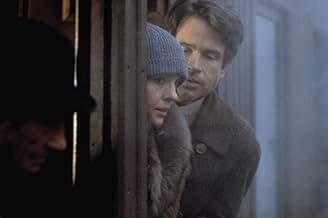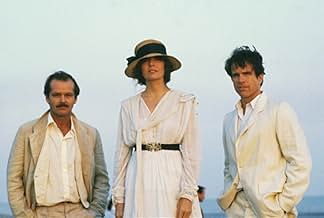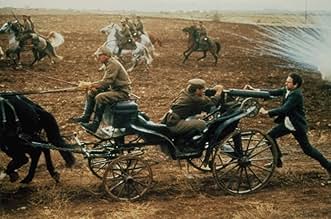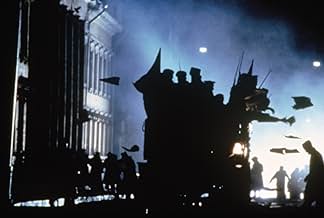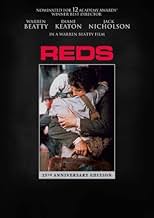VALUTAZIONE IMDb
7,3/10
25.835
LA TUA VALUTAZIONE
Un giornalista americano radicale viene coinvolto nella rivoluzione comunista in Russia e spera di portare il suo spirito e il suo idealismo negli Stati Uniti.Un giornalista americano radicale viene coinvolto nella rivoluzione comunista in Russia e spera di portare il suo spirito e il suo idealismo negli Stati Uniti.Un giornalista americano radicale viene coinvolto nella rivoluzione comunista in Russia e spera di portare il suo spirito e il suo idealismo negli Stati Uniti.
- Regia
- Sceneggiatura
- Star
- Vincitore di 3 Oscar
- 22 vittorie e 37 candidature totali
Eleanor Wilson
- Mrs. Reed
- (as Eleanor D. Wilson)
Recensioni in evidenza
A fascinating, expertly made look at why "The Red Menace" never was that, here in the United States, and why the Russian Revolution never turned out to be what it could have been.
Technically, the movie is beautiful to look at, well written and well acted. It has a lot of great professional actors in it, and lots of the people who were actually there at the time this part of our history was being made. The "witnesses" device works well for Warren Beatty who as a director and writer always seems to include the easily overlooked details of the stories in most of his films. He is also at his fumbling best as John Reed, whose 10 Days That Shook The World fell into well-deserved obscurity probably almost as soon as it was written. That this great historical perspective could rise out of that is truly a testimony to Beatty's talent.
There are many great acting performances in this film, including one of Jack Nicholson's very best as Eugene O'Neil, as well as those of Paul Sorvino, Gene Hackman and George Plimpton who demonstrate the range of persons who touched Jack Reed's life. Jerzy Kozinsky is riveting as Zinoviev.
If one likes historically based dramas, this one should leave you breathless, and will probably leave you wanting to watch it more than once, just to make sure you don't miss any of the details.
10 Stars, Absolutely.
Technically, the movie is beautiful to look at, well written and well acted. It has a lot of great professional actors in it, and lots of the people who were actually there at the time this part of our history was being made. The "witnesses" device works well for Warren Beatty who as a director and writer always seems to include the easily overlooked details of the stories in most of his films. He is also at his fumbling best as John Reed, whose 10 Days That Shook The World fell into well-deserved obscurity probably almost as soon as it was written. That this great historical perspective could rise out of that is truly a testimony to Beatty's talent.
There are many great acting performances in this film, including one of Jack Nicholson's very best as Eugene O'Neil, as well as those of Paul Sorvino, Gene Hackman and George Plimpton who demonstrate the range of persons who touched Jack Reed's life. Jerzy Kozinsky is riveting as Zinoviev.
If one likes historically based dramas, this one should leave you breathless, and will probably leave you wanting to watch it more than once, just to make sure you don't miss any of the details.
10 Stars, Absolutely.
Imagine going into a room and telling a studio you want to make a film about American Communist reporters during the 1917 Russian revolution and that it will be over three hours long and you won't even get to Russia until almost two hours in. But it was really very simple. It was Warren Beatty doing the plugging. And it actually made money. Today getting this kind of film made would be impossible for anybody. The suits want creatures from some other world wearing capes and carrying tridents spouting vague dialogue that is supposed to sound deep with lots and lots of special effects. But I digress.
So this is basically the story of John Reed and Louise Bryant, two left-wing writers and activists whose affair and marriage only lasted five years, ending with his death in Russia in 1920, but covering some incredibly important American and world history. Bryant first meets Reed when he speaks at the Liberal Club in Portland, Oregon. She's pretentious - denying that she's married or even believes in marriage - as she and Reed have an all-night discussion of writing and politics - and nothing else - at her studio around the corner. When they encounter each other by chance some days later, surrounded by people who know them both, the truth comes out in an extended meet cute encounter that Bryant is married to a dentist and living a bourgeoisie lifestyle. But she is dissatisfied and wants more.
At Reed's invitation, Bryant follows Reed back to New York City and moves into his apartment. But at first she isn't respected when she's cross examined by Reed's highbrow circle of radical friends, asked what she does, and she says she writes about "everything". The couple fights, makes up, engages in socialist politics and activism, and are separated for long periods of time, usually because Reed is galivanting about the country writing about this or that. Ultimately, the Czar is overthrown in Russia and the pair go there when it looks like the Bolsheviks will overthrow the provisional government instituted after the downfall of the Czar.
It's downhill from there for our socialist couple, because it is at this point they encounter the tired but true old saying that absolute power corrupts absolutely. Back in the United States, energized by what has happened in Russia, the Socialist Party fractures into a conventional and Communist wing, and then the Communist wing fractures yet again, largely over the issue of control. When Reed returns to Russia after the Communists have had a chance to consolidate power, he finds them to have become dogmatic and are censoring what he is allowed to say when speaking to crowds. He dies young and disillusioned in a Russian hospital.
Technically this was for sure a great accomplishment. It does a good job of drawing you into the time and place it is set. I felt like I was experiencing these important events myself rather than just watching them be recreated onscreen. The witnesses add some context, although I wish I knew more about them. I remember at the time wondering when these conversations were recorded, because in 1981 they would have had to be over 90 to have known either Reed or Bryant. The love story is convincing although the couple spends long periods of time apart.
I'd recommend it, but realize it is not for the faint of heart or those short in attention span.
So this is basically the story of John Reed and Louise Bryant, two left-wing writers and activists whose affair and marriage only lasted five years, ending with his death in Russia in 1920, but covering some incredibly important American and world history. Bryant first meets Reed when he speaks at the Liberal Club in Portland, Oregon. She's pretentious - denying that she's married or even believes in marriage - as she and Reed have an all-night discussion of writing and politics - and nothing else - at her studio around the corner. When they encounter each other by chance some days later, surrounded by people who know them both, the truth comes out in an extended meet cute encounter that Bryant is married to a dentist and living a bourgeoisie lifestyle. But she is dissatisfied and wants more.
At Reed's invitation, Bryant follows Reed back to New York City and moves into his apartment. But at first she isn't respected when she's cross examined by Reed's highbrow circle of radical friends, asked what she does, and she says she writes about "everything". The couple fights, makes up, engages in socialist politics and activism, and are separated for long periods of time, usually because Reed is galivanting about the country writing about this or that. Ultimately, the Czar is overthrown in Russia and the pair go there when it looks like the Bolsheviks will overthrow the provisional government instituted after the downfall of the Czar.
It's downhill from there for our socialist couple, because it is at this point they encounter the tired but true old saying that absolute power corrupts absolutely. Back in the United States, energized by what has happened in Russia, the Socialist Party fractures into a conventional and Communist wing, and then the Communist wing fractures yet again, largely over the issue of control. When Reed returns to Russia after the Communists have had a chance to consolidate power, he finds them to have become dogmatic and are censoring what he is allowed to say when speaking to crowds. He dies young and disillusioned in a Russian hospital.
Technically this was for sure a great accomplishment. It does a good job of drawing you into the time and place it is set. I felt like I was experiencing these important events myself rather than just watching them be recreated onscreen. The witnesses add some context, although I wish I knew more about them. I remember at the time wondering when these conversations were recorded, because in 1981 they would have had to be over 90 to have known either Reed or Bryant. The love story is convincing although the couple spends long periods of time apart.
I'd recommend it, but realize it is not for the faint of heart or those short in attention span.
This is an interesting film, all the more so because it is meant to tell a true story (insofar as any film of real events is true!)
I suppose you'll either like it or loathe it. If you like it, good; it isn't a bad film, but a bit of an idea of European history will help you.
If you you fall into the latter category loathe it because you think it's a bad film not because of the stupid bigotry shown in some of the other reviews here which seem to be so hung up on the USA and Mom and apple pie that they see "Commies" in even thinking about the event of the early 20th century!
After seeing it it made me interested enough to find out about John Reed. You might not like what he thought, you might not like Warren Beatty and what he thinks but for heaven's sake don't rubbish this film simply because it's about a political system you may not like, or have been indoctrinated not to like!
It's not brilliant but neither is it a "love poem to communism".
I suppose you'll either like it or loathe it. If you like it, good; it isn't a bad film, but a bit of an idea of European history will help you.
If you you fall into the latter category loathe it because you think it's a bad film not because of the stupid bigotry shown in some of the other reviews here which seem to be so hung up on the USA and Mom and apple pie that they see "Commies" in even thinking about the event of the early 20th century!
After seeing it it made me interested enough to find out about John Reed. You might not like what he thought, you might not like Warren Beatty and what he thinks but for heaven's sake don't rubbish this film simply because it's about a political system you may not like, or have been indoctrinated not to like!
It's not brilliant but neither is it a "love poem to communism".
"Reds" is a 200-minute epic masterpiece which deals with left-wing American journalist John Reed (Warren Beatty in an Oscar-nominated performance) and his coverage of the Russian Revolution of the 1910s. Beatty's passion is what carries this ambitious film, which could have easily been a multi-million dollar disaster. His Oscar-winning direction, screenplay, and overall performance carry the film as far as it can possibly go. The top-flight performances by Diane Keaton, Jack Nicholson (both Oscar-nominated), and Maureen Stapleton (Oscar-winning) all add great depth to the performance. Paul Sorvino, Edward Herrmann, and Gene Hackman also make lasting impressions in supporting roles. Overall a great achievement all the way around. 5 stars out of 5.
This movie was great, and I hope it comes out on DVD real soon. Beatty became Reed in more than one sense--not only did he act the part, but he directed the movie in a way reminiscent of the kind of "new journalistic" style that Reed and his fellow MASSES writers pioneered, mixing the drama with interviews of people who knew JR, Louise, etc.
The film also sort of puts forward the question, "What if, instead of running back to Russia (to die of kidney failure and mistreatment by the CP), Jack Reed had stayed in this country to build the CP? Would it have turned out to become Stalinist?" According to Howe and Coser, who wrote a good book on THE AMERICAN COMMUNIST PARTY, much like Rosa Luxemburg and Karl Liebknecht in Germany, Reed was the ONLY leader who was independent, who had some real backbone.
The best part of the movie is when Emma Goldmann, played by Maureen Stapleton, tells Jack that "it doesn't work" (i.e. statist, bureaucratic socialism that the Bolsheviks were instituting as a grossly mistaken response to the economic crisis and Allied invasion of Russia after the Revolution). And then his rebellion against the lying propaganda of Zinoviev. Kind of hits me right now that Jerzy Kosinski should play Zinoviev--didn't he commit suicide when he was exposed as a plagiarist? Where is the line between art and reality, politics and life?
Of course I loved the romantic reality between Beatty, Bryant, and Nicholson (Reed, Bryant, and Eugene O'Neill). And the cynicism that Reed expresses about the Democrats and Wilson is certainly apropos today.
The film also sort of puts forward the question, "What if, instead of running back to Russia (to die of kidney failure and mistreatment by the CP), Jack Reed had stayed in this country to build the CP? Would it have turned out to become Stalinist?" According to Howe and Coser, who wrote a good book on THE AMERICAN COMMUNIST PARTY, much like Rosa Luxemburg and Karl Liebknecht in Germany, Reed was the ONLY leader who was independent, who had some real backbone.
The best part of the movie is when Emma Goldmann, played by Maureen Stapleton, tells Jack that "it doesn't work" (i.e. statist, bureaucratic socialism that the Bolsheviks were instituting as a grossly mistaken response to the economic crisis and Allied invasion of Russia after the Revolution). And then his rebellion against the lying propaganda of Zinoviev. Kind of hits me right now that Jerzy Kosinski should play Zinoviev--didn't he commit suicide when he was exposed as a plagiarist? Where is the line between art and reality, politics and life?
Of course I loved the romantic reality between Beatty, Bryant, and Nicholson (Reed, Bryant, and Eugene O'Neill). And the cynicism that Reed expresses about the Democrats and Wilson is certainly apropos today.
Lo sapevi?
- QuizReportedly, Warren Beatty reshot some scenes up to 35 times. Paul Sorvino said he did as many as 70 takes for one scene, and Maureen Stapleton said she did as many as 80 takes for another. Reportedly, of this, she famously once said to Warren Beatty, "Are you out of your fucking mind?" This earned her a round of applause from the crew.
- BlooperThe Finnish doctor tells Reed that his blood pressure is too high, but at that time, hypertension was not considered a problem by most doctors, who did not even consider treating it. Not until the mid-'40s did doctors begin to understand the dangers of high blood pressure.
- Citazioni
Eugene O'Neill: If you were mine, I wouldn't share you with anybody or anything. It'd be just you and me. We'd be the center of it all. I know it would feel a lot more like love than being left alone with your work.
- Curiosità sui creditiAs the credits roll, additional interviews with the 'witnesses' play.
- Versioni alternativeThree seconds of horse falls were cut from the British version. The DVD supplements showing these shots are also cut in England.
- ConnessioniFeatured in Sneak Previews: Rollover, Quartet, My Dinner with Andre, Reds (1981)
- Colonne sonoreYou're a Grand Old Flag
Written by George M. Cohan
I più visti
Accedi per valutare e creare un elenco di titoli salvati per ottenere consigli personalizzati
- How long is Reds?Powered by Alexa
- Who is the singer of "I Don't Wanna Play in Your Yard?"
Dettagli
- Data di uscita
- Paese di origine
- Lingue
- Celebre anche come
- Comrades
- Luoghi delle riprese
- Senate Square, Helsinki, Finlandia(on location)
- Aziende produttrici
- Vedi altri crediti dell’azienda su IMDbPro
Botteghino
- Budget
- 32.000.000 USD (previsto)
- Lordo Stati Uniti e Canada
- 40.382.659 USD
- Fine settimana di apertura Stati Uniti e Canada
- 2.325.029 USD
- 6 dic 1981
- Lordo in tutto il mondo
- 40.382.788 USD
Contribuisci a questa pagina
Suggerisci una modifica o aggiungi i contenuti mancanti



